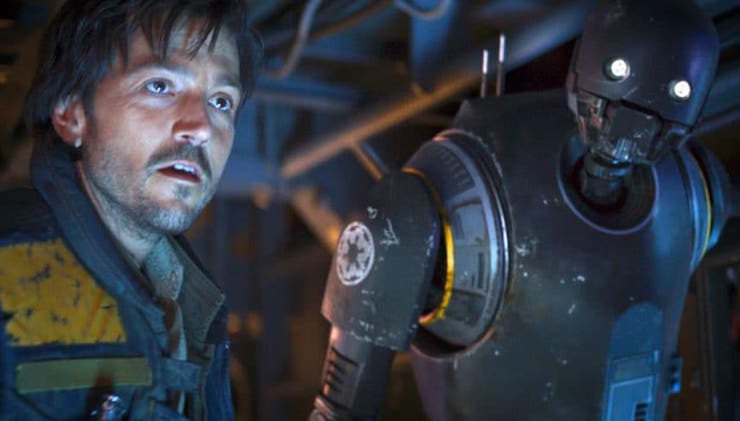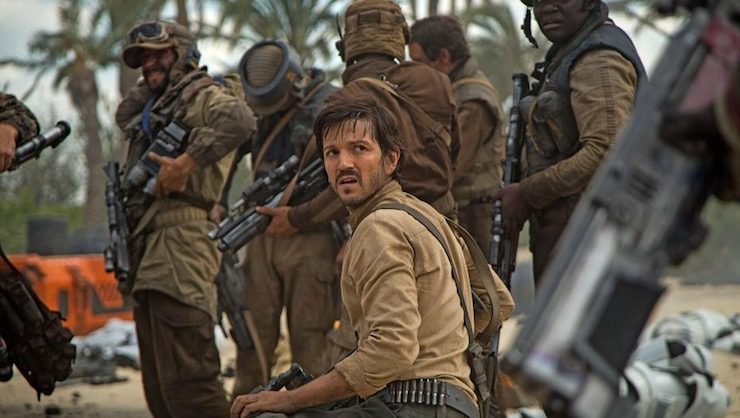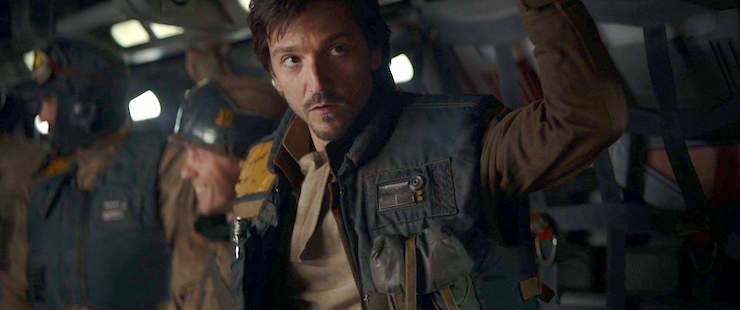Even two months after the movie’s initial release, I’m still ruminating on the fact that there is more to every lead character in Rogue One than the script (which can be a bit cursory) might make you think: Jyn and Bodhi are the spiritual architects of the Rebel Alliance as we know it. Baze and Chirrut, besides being the best Gay Space Dads Ever, embody the fundamental faith and code of honour that the Empire can never destroy. And Cassian and K2S0 embody the redemption inherent in resistance (as well as being the closest the movie gets to giving us a Han and Chewie dynamic).
Given the events of act three of The Force Awakens and of A New Hope itself, a Han analogue was always going to be part of Rogue One. This is the universe of the Star Wars movies at their most lawless and fluid: the Empire closing its fist around the worlds of the Old Republic while scoundrels, thieves, and gangsters take what they can from the rapidly shrinking territory still left. That’s what makes Han’s journey through the original movie so compelling—he willingly and heroically sacrifices his own freedom and, potentially, his life, for something bigger than he is. Plus he looks awesome doing it.
So when we first see Cassian, we instinctively file him into the same role. He’s at ease in the shadowy corners of the Star Wars universe, reasonable and calm—until he kills his informant rather than rescuing him, that is. Except that, from Cassian’s point of view, he kills his informant in order to rescue him: where Han shoots Greedo to save himself, Cassian commits murder to save his victim from torture at the hands of the Empire AND to save himself. It’s a fierce statement of intent for both the movie and the character. Cassian Andor isn’t a charming rogue—he’s a soldier, and one whose moral centre was the first casualty of the war he’s been dragged into.
It’s also clearly something he’s painfully aware of. He’s the first one in the movie to say “Rebellions are built on hope,” but when he says it, it plays more like a psychological lifeline he’s clinging to than a rallying cry. Cassian Andor has done a lifetime of terrible things in the service of what he desperately hopes is the right cause—and arguably very few of those deeds are more terrible, or at least more morally complex, than his “saving” of K2S0. Cassian’s only true friend in the movie is K2S0, and that fact speaks volumes about just how lonely he is. K2 is, and let’s be fair to him here, a murder bot. He’s an Imperial Security droid who is effortlessly good at making people dead, and when looked at in that way, you can almost see Cassian envying and pitying him in equal measure. He’s everything Cassian feels that he needs to be without the constant guilt: an ideal and a victim, an opponent and an asset all at once.

K2 is the character least likely to be saved and yet Cassian has done exactly that. The fact he’s done so in a way that required violating the droid’s programming and personality only drives home just how morally complex Cassian’s world is. And then there’s the moment where he pressures K2 into lobotomising another security droid to get them the information they need. A boy and his droid. A reluctant murderer and an artificially-reformed one. If K2 is Chewie to Cassian’s Han, their bond is spikier, darker, and no less touching for that. It’s also, arguably, far more complicated. Han saved Chewie’s life. Cassian reprogrammed K2 to be a better weapon.
Much like Amos Burton in The Expanse, Cassian is absolutely at peace with the possibility of his death. And, much like Amos, he has no problem doing whatever has to be done to get the people he cares about to a better place. Sometimes that means killing an infirm, panicking informant so that the Empire won’t torture him. Sometimes it’s assassinating an unarmed man from a rocky sniper’s nest so the most obscene weapon in Republic history will die before it can ever kill.
And sometimes, it means not pulling the trigger at all.
The Eadu scenes serve as the mortal hub of the movie. It’s there that Jyn is briefly reunited with Galen, there that we see some of the strongest evidence of Baze and Chirrut’s love for one another, there that Bodhi finally becomes a Rebel, and there, most of all, that Cassian wakes up. His refusal to execute Galen is not only the polar opposite of the first thing we see him do, but also the first time we see him make a choice for himself. It’s a moral judgment by a man who has made himself amoral out of necessity. It’s also one of the many moments in the film where we glimpse the tiny personal rebellions that become the seeds for the larger, uniformly individualistic rebellion of the original trilogy. To use the obvious phrase, with this act Cassian goes rogue. And then, later, goes Rogue.
That bigger, more sweeping moment, when he rallies the Rebellion’s best and most broken, is Cassian’s finest hour. Surrounded by his fellow toy soldiers, all of them eager to fight the Good Fight—not just the necessary one—he takes the stand he wants instead of the one he’s been ordered to take. It’s also tidy visual shorthand for a level of political complexity that the series has previously only flirted with. These men have all clearly done very bad things in the name of the Rebellion and are all walking wounded as a result. They see their chance at redemption in both the probability of near-certain death in taking on the Scarif mission and the absolute moral certainty of Jyn’s plan and convictions. I’ve talked elsewhere about how Jyn and Bodhi shape the Rebellion into the Rebel Alliance and this is a huge part of that shift, the sacrifice necessary to fuel that transformation. Their faith in this moment offers these soldiers something morally concrete, but because it also offers them a way out. No one who goes to Scarif expects to return. I’d argue that the vast majority of the rebels are at peace with that outcome, and maybe even welcome it.

This is ultimately where Cassian and Han truly stand on common ground: both outsiders with blood on their hands, choosing to fight the good fight because it’s a good fight and not because of some fading sense of duty or obligation. This is nowhere more evident than in his actions throughout the Scarif raid. Cassian, and K2, are both there as close protection, support, and backup for Jyn. She’s the one who steals the plans, the one who transmits them, and the one who ultimately completes the mission. Cassian and his delightful, external robotic id are ready to lay down their lives to protect her, to give her all-important mission a chance a success. It’s especially significant that Cassian is the one who stops Krennic, as well—the man who has given everything to a cause he believes will make him great is downed by the man who chooses to stand for a cause much greater than himself.
In the end, Cassian really is the Han analogue in Rogue One. They both gradually break through a self-created shell of amorality, engage with their world on their own terms, and do so in full knowledge of the price they’ll pay. And in the end, they both, despite their apparent cynicism, willingly sacrifice their lives for the belief that doing so will make things better for everyone. Cassian, it turns out, was right. We still have to wait for another couple of movies to find out if Han was…but I wouldn’t bet against him.
Alasdair Stuart is a freelancer writer, RPG writer and podcaster. He owns Escape Artists, who publish the short fiction podcasts Escape Pod, Pseudopod, Podcastle, Cast of Wonders, and the magazine Mothership Zeta. He blogs enthusiastically about pop culture, cooking and exercise at Alasdairstuart.com, and tweets @AlasdairStuart.










